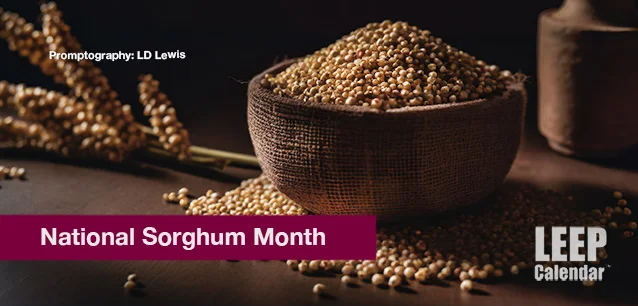 AD
AD
Today is: November 24
Scroll to explore events active on this date.
LEEP INK FEATURES

Nuanced November 2024
November is the start of the holiday season in many parts of the world. It is a time for family, football, food, shopping and decorating, particularly in the Christian and Jewish world, leading to Christmas and...

December's Gift
Events in December 2024. Well, we made it to December. December is the holiday season, particularly in Western nations, where Christianity and Judaism are the faiths most common in the nation's past. ...

August is Appropos
A toddler playing in the fountain at a park in Santa Fe, New Mexico—Photo LD Lewis. In August, we live through the Dog Days of Summer. It's hot and often humid, and those ...
About Sorghum Month
Retail , United States
Ends: Jun 30, 2025
DESCRIPTION:
June is Sorghum Month.
Sorghum, a grain known for its resilience and versatility, has a rich history that spans several continents and thousands of years. In Africa, specifically the northeastern regions, sorghum has been a staple crop for millennia, dating back to approximately 3000 BC in ancient Egyptian civilizations. Its ability to thrive in arid and semi-arid regions made it a vital crop for societies in these harsher climates.
Sorghum's journey from Africa to other parts of the world is a story of agricultural adaptation and cultural exchange. Traders introduced the grain to the Middle East and Asia along ancient trade routes, where it became an important food source in these regions as well. Later, traders brought it to the Americas during the transatlantic slave trade, where it adapted well to the southern United States and integrated into American agricultural systems.
In terms of its culinary uses, sorghum is incredibly versatile. African cuisine features sorghum in traditional dishes such as porridge, bread, and fermented beverages. In the United States, cooks used it as a sweetener, with sorghum syrup being a popular alternative to sugar cane syrup in the South. The grain's mild, nutty flavor makes it a suitable ingredient for various dishes, and it cooks and works into recipes as a replacement for rice or quinoa.
Sorghum also holds a significant place in the gluten-free market. As awareness of gluten sensitivities has increased, sorghum flour has become a popular alternative for wheat flour in baking, appealing to those who follow a gluten-free diet. Additionally, the grain is high in nutrients like fiber, protein, and antioxidants, making it a desirable choice for health-conscious consumers.
The history of sorghum is not just about its adaptability as a crop; it's also a reflection of human resilience and ingenuity. From its origins in Africa to its spread across the globe, sorghum has played a crucial role in sustaining populations in diverse environments. Today, it continues to be an essential food source worldwide, particularly in developing countries, and its popularity in Western health food markets is a testament to its enduring nutritional value and versatility.
VIDEOS
SUPPORTING DOCUMENTS
Currently, this event does not have supporting documents.
ADDITIONAL IMAGES
Currently, this event does not have supporting images.
Where would you like to go now?
 AD
AD


/footer-logo.svg)
